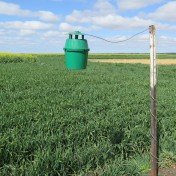The 2018 spring Helicoverpa pheromone trapping program for the Northern Grains Region has recently concluded. The program, run by the Queensland Department of Agriculture and Fisheries for the Northern Grain Growing region, forms part of the national Helicoverpa monitoring network jointly run by DAF, cesar, SARDI, and DAFWA. The primary purpose of the trapping network is to detect high moth… Read more »
As canola sets and matures pods, and spring temperatures rise, there are a number of caterpillar pests that are active in this crop. Along with helicoverpa there are diamondback moth larvae (Plutella xylostella) and cabbage white butterfly larvae (Pieris rapae) in crops. It is critical that you can distinguish the species, and be familiar with their respective thresholds, in order… Read more »
Crops are most susceptible to pest damage at the seedling stage. Pests feeding on seedlings can reduce plant establishment, increase weed competition, delay flowering and lower yields. In some cases there may be a need for re-sowing. Most of the establishment pests found in the northern region are soil-dwelling insects. Soil insects may be difficult to detect prior to sowing…. Read more »
As the cotton season draws to a close it is time to for the DAFF team working on Silverleaf whitefly (SLW) resistance monitoring to start making collections of whitefly from across the cotton-growing regions. Even if SLW numbers are below threshold, it is possible for the team to make collections of either nymphs (on leaves) or adults (using the suction… Read more »

